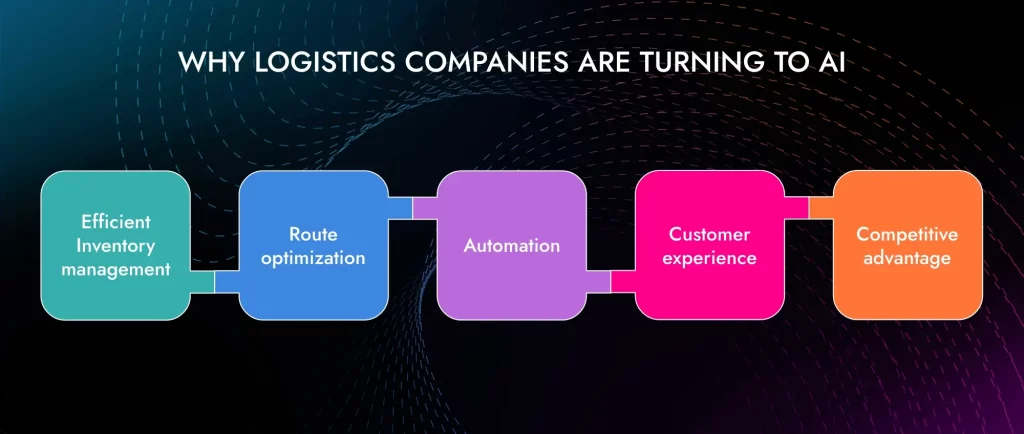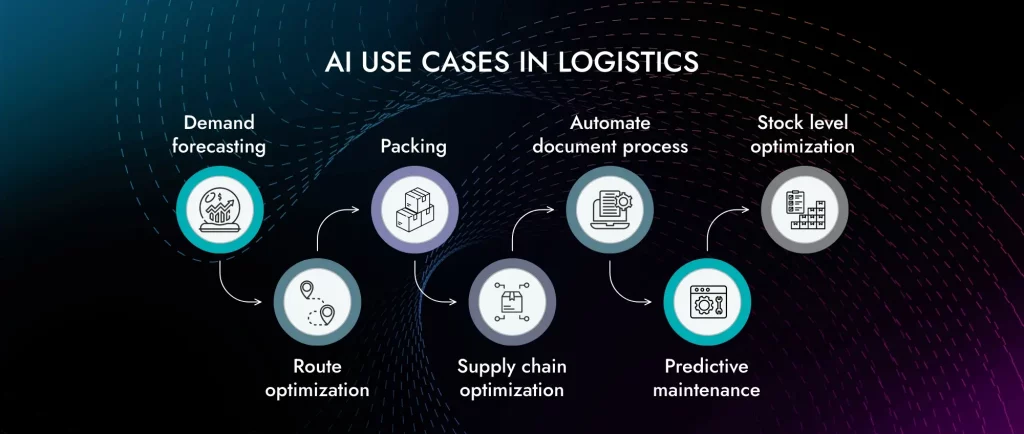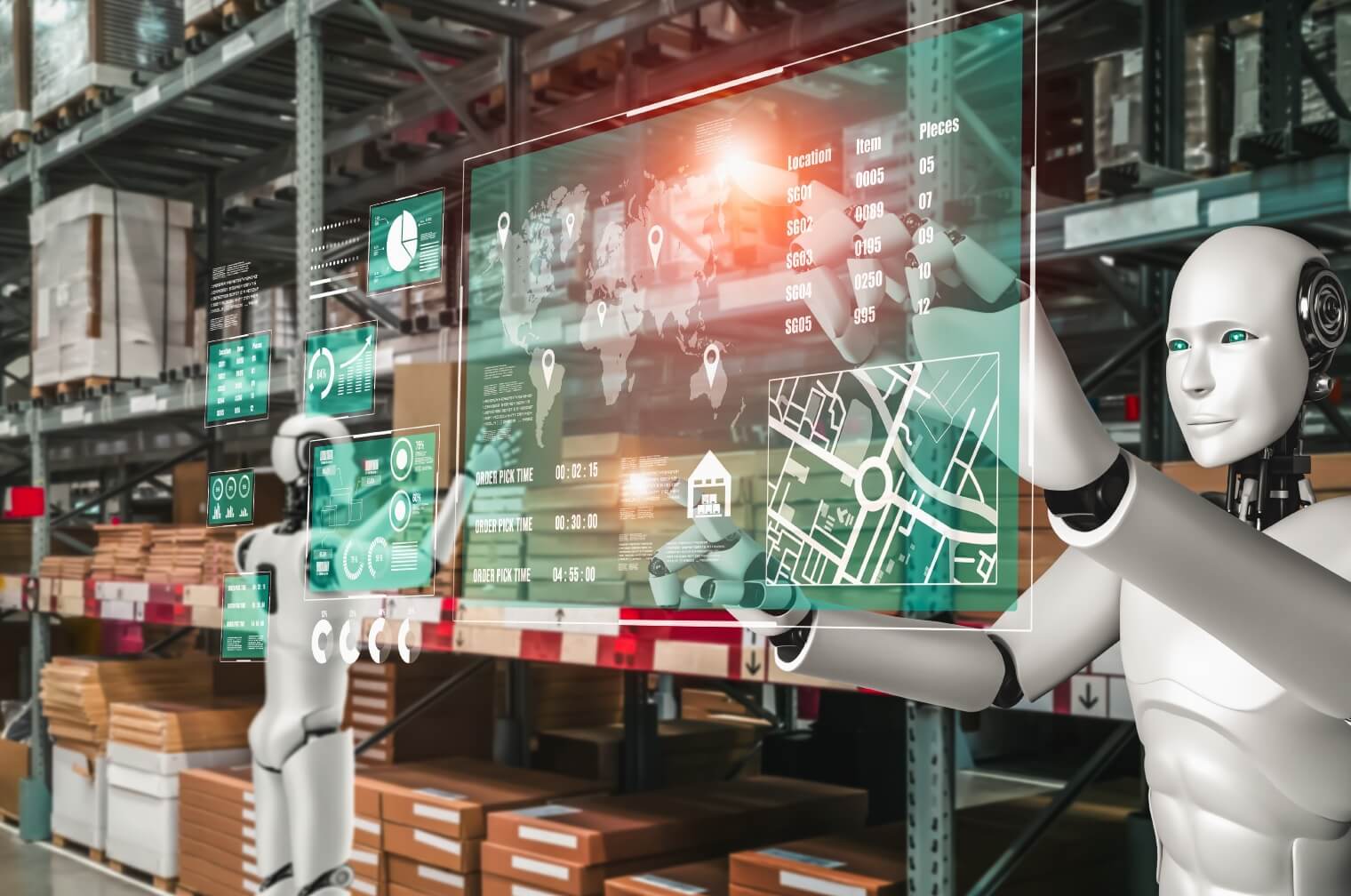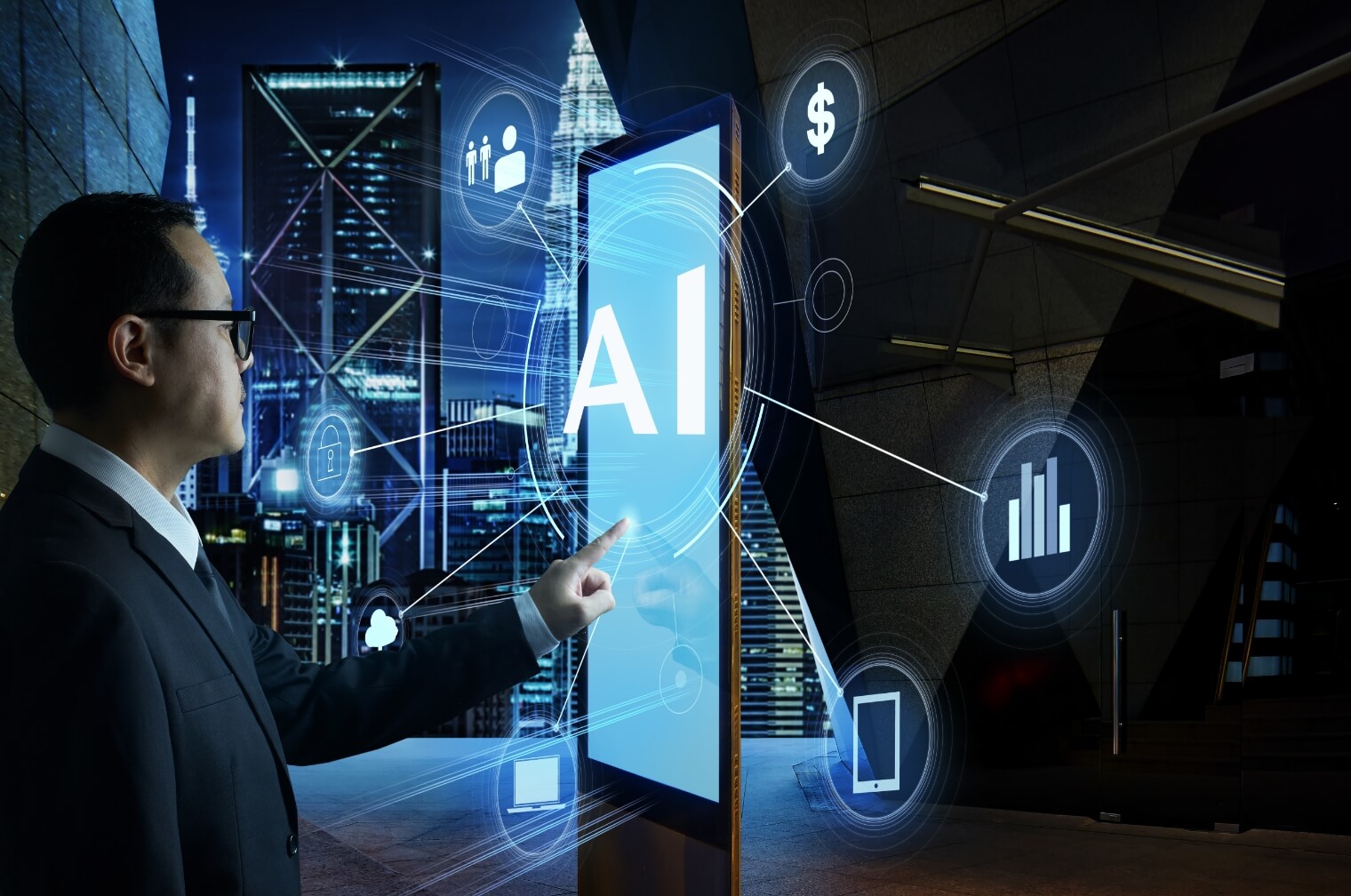Machine Learning and AI for revolution of Tech Companies are changing and streamlining businesses.
ViitorCloud’s AI development service is revolutionizing the logistics industry. From automating operations to optimizing supply chains for faster product delivery, we provide tailored AI solutions that elevate customer satisfaction and streamline your logistics business.
Imagine controlling predictive analytics to improve demand forecasting, or deploying autonomous vehicles to save time and reduce costs. Our AI-powered systems navigate complex routes effortlessly, guaranteeing your products reach their destination swiftly.
Join us as we explore why leading logistics companies are adopting AI and explore 7 AI use cases in logistics. With ViitorCloud’s expertise, your business is going to stay ahead of the curve, achieving exceptional efficiency and growth.
Why logistics companies are turning to AI
AI innovations help various businesses in the world achieve sustainable growth. It allows enterprises to boost management capabilities and organize work in the company. A report by McKinsey, predicts that AI will create a new logistics world by 2030 as it continues to automate repetitive tasks and solve the problems that arise in the logistics industry. Let’s understand in detail why logistics companies are turning to AI.

Efficient Inventory management
Al helps track customer demand using past data, leading to inventory management. As a result, labor costs for manual inventory management are reduced. Also, AI helps with predictive maintenance for inventory and risk management to ensure efficient supply chain operations.
Route optimization
Route optimization is possible with AI as it can analyze datasets to understand traffic patterns, weather conditions, road networks, and delivery schedules. Also, AI helps adjust the route to unforeseen conditions and ensures fast delivery of products with the help of the right path. Additionally, route optimization reduces fuel consumption and cost of delivery.
Automation
AI automation increases efficiency by optimizing routes and scheduling inventory management, reducing cost and delivery times. Automation helps sort, pack, and reduce human errors. Also, chatbots solve customers’ queries anytime, which improves the customer experience.
Customer experience
AI chatbots solve queries and offer instant support to the customer. Also, predictive analysis anticipates customer needs, provides personalized recommendations and communicates efficiently. AI builds trust and confidence in customers with transparency in communication.
Competitive advantage
AI helps the logistics business by automating the task of analyzing customer data to optimize the route, inventory, and warehouse management. Also, data analysis provides insights for optimizing operations, resource allocation, and informed decision-making. The collaboration of AI technology in logistics improves logistics performance and delivers a competitive edge.
This is how AI logistics solutions work in the logistics industry.
Also Read: Benefits of AI in Logistics Startups
ViitorCloud’s advanced AI solutions can streamline your operations, cut costs, and enhance efficiency. Reach out to ViitorCloud for our AI services tailored to your logistics requirements.
AI use cases in logistics
AI is changing the logistics industry, from optimizing the warehouse system to optimizing delivery routes and predictive maintenance. It helps businesses to improve efficiency, reduce costs, and increase profit.
Let’s understand in detail the AI use cases in logistics.

1. Demand forecasting
The first AI logistics use case is Demand forecasting. AI analyzes the history of customer data, weather patterns, predictive analysis, and regional events to forecast demand for products in the market. This demand forecasting helps improve costs, supply chain management, and customer satisfaction.
2. Route optimization
When the product is delivered with a manual plan, it leads to inefficiency and increased cost. While the AI algorithms analyze factors such as traffic patterns, fuel consumption, road conditions, and delivery points. Based on analysis, AI generates an efficient route for product delivery, reducing costs and travel time. Also, helps the environment to be sustainable. Route optimization is one of the logistics use cases that reduces the cost of the logistics business.
3. Packing
AI can analyze a significant amount of data and identify patterns; AI software is used to assist in packing the items with the carrier rates. Using AI in packing increases efficiency and reduces error and handling time. Packing the item in a box is difficult because of various factors, such as the size and shape of the box, weight, and fragility. AI helps solve packing issues by using data to create a 3D model of the box and items, and this model determines the efficient and less costly way to pack items in the box. Packing is one of the AI use cases in logistics that makes packing work efficiently.
4. Supply chain optimization
Supply chain work is complex and time-consuming, and human error is more prevalent. However, AI is more intelligent and efficient in managing the supply chain. Because it forecasts the demand for products, predicts maintenance, manages the supply chain relation, and optimizes route planning.
5. Automate document process
AI logistics use cases automate document processes where AI helps automate the manual and time-consuming documentation process in logistics. It uses systems like Optical Character Recognition and Natural Language Processing to read, understand and extract information from digital and physical documents. As a result, data entry work becomes fast, and manual errors are reduced, decreasing time and cost.
6. Predictive maintenance
One of the AI logistics use cases is predictive maintenance. Predicting the machine’s maintenance is difficult, but AI has made it easy. Al algorithms analyze data from the sensor on equipment and identify patterns of machine breakdown. This saves maintenance costs and time. Also, AI logistics solutions detect damaged goods while delivering goods. As a result, minimized losses happen, and customers are satisfied.
7. Stock level optimization
AI analyzes historical sales data and real-time demand data to predict the stocking requirements of the product in the business. This reduces overstocking inventory and stockouts and improves customer satisfaction and cost. Also, makes the operation efficient and profitable.
It is how the AI use cases in logistics improve the productivity and efficiency of logistics business.
Read: AI Applications in Logistics for Entrepreneurs
Are you prepared to push your logistics business to new heights? Partner with ViitorCloud for advanced AI services that boost growth and improve operational prowess.
How ViitorCloud helps logistics industries
Incorporating AI into your logistics business has modernized operations and customer service. With AI algorithms, you can optimize routes, automate warehouse operations, upgrade inventory management, and improve delivery efficiency. Additionally, AI increases supply chain visibility and supports better decision-making processes.
At ViitorCloud, an AI development service company, we specialize in transforming logistics businesses with advanced AI solutions. Our expert team understands your unique needs and provides tailored AI integration to push productivity and efficiency in your operations. Partner with us to boost your business and achieve steady growth. Contact us for a consultation and optimize your logistics industry with AI today.
Frequently asked questions
The impact of AI on logistics operations is to enhance the supply chain by analyzing factors such as sales data, cost, production schedules, and lead time. This analysis helps businesses to determine reorder level and stock level.
The use of AI in logistics is to analyze the data, optimize the route, and deliver the product on time. Also, AI helps reduce the overstocking of products in a warehouse by forecasting demand and predicting maintenance to make the logistics operation work smoothly.
AI is used in logistics solutions to optimize the operation of the supply chain, such as machine learning to manage inventory, predict demand, and optimize delivery routes. As a result, the cost and efficiency of the business are reduced.









